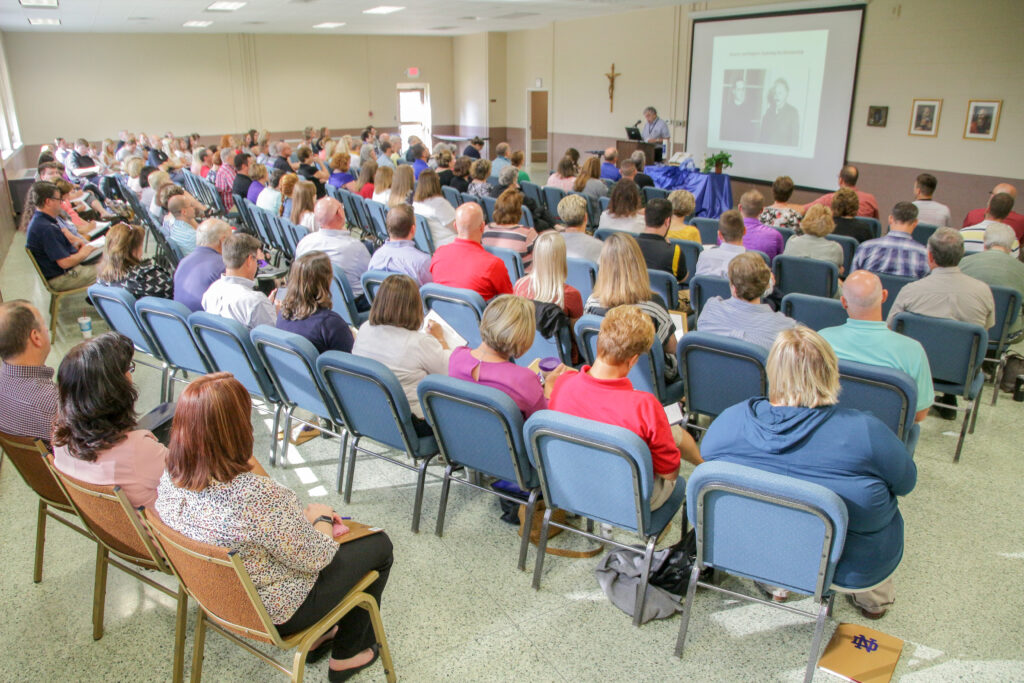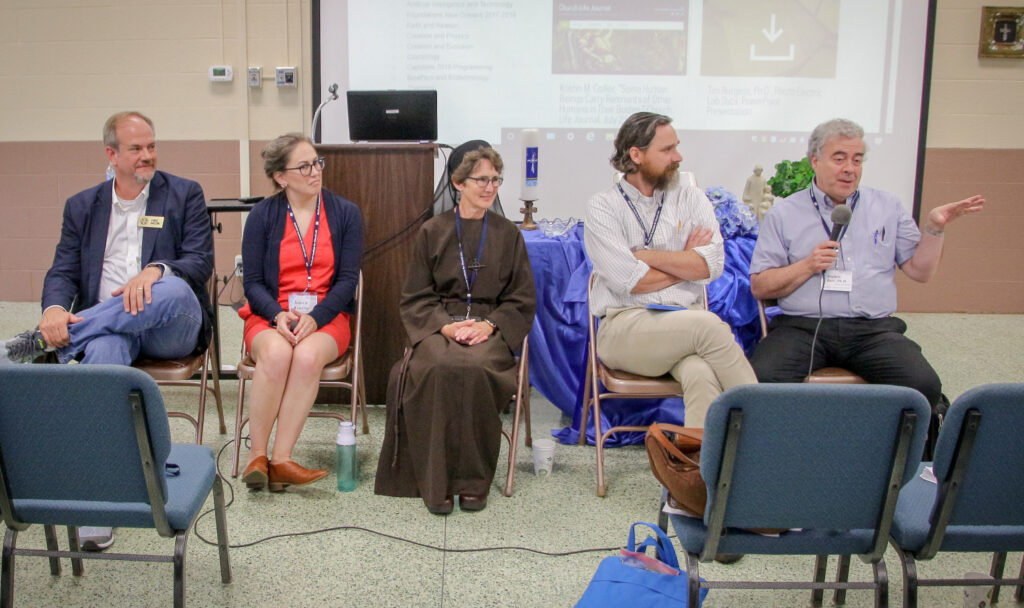By Tim Lilley
The Message editor
Hundreds of educators who serve in a variety of roles visited the Diocese of Evansville Catholic Center Sept. 13 to attend an Institute Day that explored the relationship between faith and science. The McGrath Institute for Church Life at the University of Notre Dame and the Diocese of Evansville offices of Catechesis, Catholic Schools, and Youth and Young Adult Ministry co-sponsored the daylong workshop.
Attendees included Catholic school teachers and principals, parish catechetical leaders, priests, deacons, youth ministers and catechists.
Following morning prayer with Bishop Joseph M. Siegel to open the workshop, Dr. Stephen Barr, professor of physics at the Univeristy of Delaware, delivered the day’s keynote address: “The Catholic Church and Modern Science: A Glorious History.”
“People ask how we can reconcile faith and science,” he said. “I find that an odd question. I know of no scientific fact that conflicts with Catholic teaching. Catholic faith and modern science make sense of the world.”

The Message photo by Tim Lilley
Dr. Barr credited misconceptions with leading people to believe that kind of disconnect exists – misconceptions about what science has discovered and misconceptions about what biblical religions teach.
He described a view where perceptions see opposition between religion, or supernatirualsm, with science, or naturalism. “Biblical religions have never been based on supernaturalism if that includes renouncing the natural order,” Dr. Barr explained. “Biblical religions teach that there is a natural order that comes from God. Early Christian writers actually used the natural order as evidence of God.”
Dr. Barr called God “the lawgiver of the Cosmos. We see there is a natural order; a lawful order. If there is a law, there is a lawgiver.” He said the idea of God as lawgiver gave birth to the concept of natural law.
He added that biblical religions do teach about supernaturalism in the form of miracles. “The concept of supernaturalism presupposes a natural order that determines what is natural,” he explained. “The same lawgiver can suspend the laws … override them (through miracles), and that is always connected in some way to salvation.”
Dr. Barr added, “If God created the world and established the natural order and laws, proof of his existence can be found in nature.”
He noted several great figures of the Scientific Revolution who were devoutly religious – including Copernicus, Keppler, Galileo, Newton and others. He also pointed out that Catholic priests played enormous roles in the scientific discoveries of modern geology, acoustics, hydraulics, genetics and other things.
Maybe the best known is Belgian priest, astronomer and physicist Father Georges Lemaître, who formulated the Big Bang Theory.
A series of morning and afternoon breakout sessions followed Dr. Barr’s keynote.

The Message photo by Tim Lilley
Presenters and their topics included:
Christopher T. Baglow, Ph.D., "Becoming Human: Jesus Christ, the True Origin of Humanity." Dr. Baglow is Director of the Science and Religion Initiative of the McGrath Institute for Church Life of the University of Notre Dame. Since 2005 he has been a leader in the integration of faith and science in Catholic schools.
Cory Hayes, Ph.D., “Science and the Bible: The Catholic Approach to the Relationship.” Dr. Hayes is a professor of Philosophy and Theology at St. Joseph Seminary College in Covington, Louisiana. He holds a Ph.D. in Systematic Theology from Duquesne University in Pittsburgh, Pennsylvania.
Jessica Keating, M.Div., “What is Human Dignity.” Keating directs the Notre Dame Office of Life and Human Dignity in the McGrath Institute for Church Life. She leads the Institute’s research, education, and outreach efforts on the nature and dignity of the human person and contemporary threats to the sanctity of life.
Franciscan Sister of the Eucharist Damien Marie Savino, “Evolution, Ecology, and Faith: What is Man that You are Mindful of Him.” Sister Damien is the Dean of Science and Sustainability at Aquinas College in Grand Rapids, Michigan. In this position she oversees the Biology, Chemistry, Physics, Geography and Environmental Studies departments and the college’s Center for Sustainability.
Following Institute Day, the Evansville Museum of Arts, History and Science hosted an evening event that included a special planetarium program in its Koch Immersive Theater and Planetarium: “Let There Be Light - The Holy See Exhibit at the World Expo 2017.” The expos occurred in Astana, Kazakhstan.
Cardinal Peter K. A. Turkson of the Vatican's Dicastery for Promoting Integral Human Development commissioned “Let There Be Light” to serve as the opening segment of the Holy See’s exhibition, “Energy for the common good: Caring for our common home,” at the 2017 International Expo Future Energy in Astana, Kazakhstan. In it, Dr. Philip Sakimoto and Dr. Leonard DeLorenzo, both from the University of Notre Dame, trace the history of light from the Big Bang to the present-day Sun, offering both astronomical and theological perspectives on this fundamental gift of Creation.
The event marked the first time that “Let There Be Light” has been shown to a public audience outside of the International Expo or the production facilities at Notre Dame. Dr. Sakimoto attended and, before the program, discussed the process of creating “Let There Be Light” and installing it in the Vatican’s pavilion. Afterward, he talked about public reaction to the Vatican’s presence at the Expo as an advocate for the moral imperative to care for our common home.
